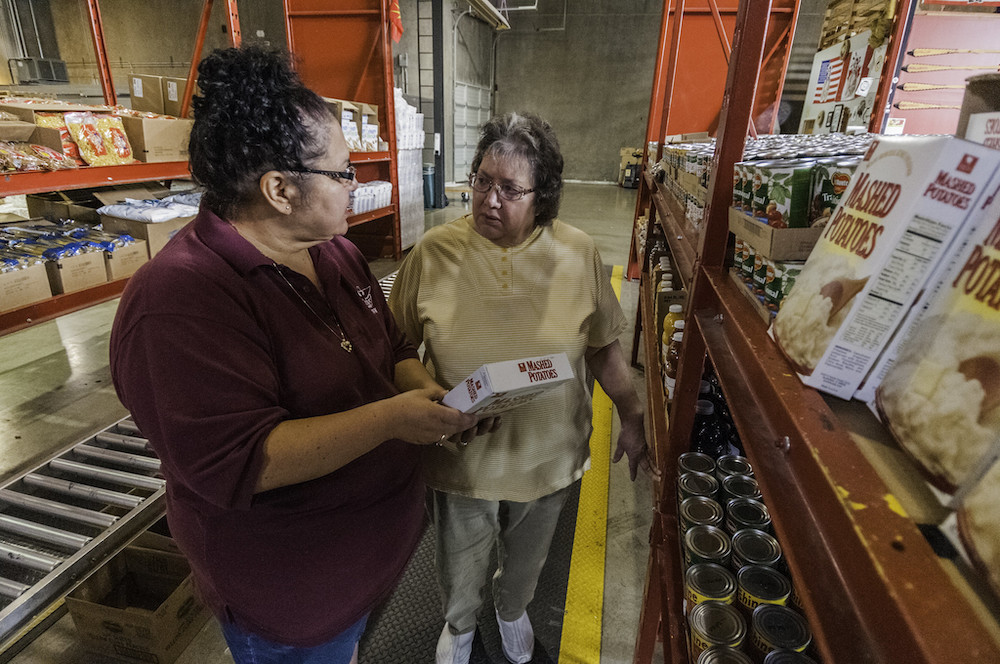
- Details
- By Brian Edwards
On Monday, congressional leaders from the powerful Senate and House appropriations committees ramped up pressure on the U.S. Department of Agriculture (USDA), seeking answers and swift action to address food shortages impacting Native American communities.
In a detailed letter to Agriculture Secretary Tom Vilsack, the bipartisan, bicameral group of lawmakers demanded an explanation for the USDA’s handling of the Food Distribution Program on Indian Reservations (FDPIR), which they say has resulted in months of delayed, inconsistent, and incomplete food deliveries to tribal communities across the country.
[Editor's Note: This article was originally published by Tribal Business News, Native News Online's sister publication. Used with permission. All rights reserved.]
The letter today follows an earlier one sent Aug. 23 by a bipartisan group of seven senators who expressed their alarm over disruptions to FDPIR deliveries since April, when the USDA consolidated its tribal warehouse operations to a single contractor, Kansas City, Mo.-based Paris Brothers Inc.
“Tribes are deeply worried about when food will arrive and when USDA will resolve this situation,” Senate and House lawmakers wrote in Monday’s letter. “It is the federal government’s responsibility to uphold its trust and treaty obligations to Tribes, and this situation must be resolved immediately.”
Today’s letter requests information and documentation regarding the transition to one contractor, timelines of events, communication with stakeholders, impact on Tribes, accountability of the contractor, and actions being taken to resolve the situation. The congressional members urged immediate action to rectify the food shortage crisis and emphasize the importance of upholding trust and treaty obligations to tribal communities.
They also inquired about potential impacts on other food distribution programs, such as the Commodity Supplemental Food Program (CSFP), which serves low-income seniors.
The lawmakers have set a deadline of September 9 for the USDA to provide a comprehensive response to their questions, along with any relevant documentation. The letter was signed by a group of high-ranking members from both chambers, including House Appropriations Chairman Tom Cole (R-OK) and Ranking Member Rosa Delauro (D-CT), as well as Senate Appropriations Chair Patty Murray (D-WA), and Senate Appropriations Vice Chair Susan Collins (R-ME).
In a statement, Cole, an enrolled member of the Chickasaw Nation of Oklahoma and the first Native American to serve as chairman of the House Appropriations Committee, said the disruptions to vital safety net programs were unacceptable and failed to uphold our trust and treaty obligations. “Tribes’ voices have been heard and will continue to be at the forefront as Congress further investigates this crisis,” Cole said.
The FDPIR serves more than 50,000 Native American households each month, providing essential food assistance to income-eligible families.
Mary Greene Trottier, president of the National Association for FDPIR, told Tribal Business NewsTribal Business News on July 13 that the situation had been dire for months. “We’re hearing from almost every tribe participating in the program that they’ve been impacted in some way,” Trottier said. “People are going without.”
More Stories Like This
Native News Weekly (August 25, 2024): D.C. BriefsUS Presidents in Their Own Words Concerning American Indians
Indigenous Actor Elaine Miles Reports Detention by Alleged ICE Agents
Happy Thanksgiving from Native News Online
Coming Up on Native Bidaské: Behind the Animation: Joey Clift Talks “Pow” and Native Storytelling
Help us tell the stories that could save Native languages and food traditions
At a critical moment for Indian Country, Native News Online is embarking on our most ambitious reporting project yet: "Cultivating Culture," a three-year investigation into two forces shaping Native community survival—food sovereignty and language revitalization.
The devastating impact of COVID-19 accelerated the loss of Native elders and with them, irreplaceable cultural knowledge. Yet across tribal communities, innovative leaders are fighting back, reclaiming traditional food systems and breathing new life into Native languages. These aren't just cultural preservation efforts—they're powerful pathways to community health, healing, and resilience.
Our dedicated reporting team will spend three years documenting these stories through on-the-ground reporting in 18 tribal communities, producing over 200 in-depth stories, 18 podcast episodes, and multimedia content that amplifies Indigenous voices. We'll show policymakers, funders, and allies how cultural restoration directly impacts physical and mental wellness while celebrating successful models of sovereignty and self-determination.
This isn't corporate media parachuting into Indian Country for a quick story. This is sustained, relationship-based journalism by Native reporters who understand these communities. It's "Warrior Journalism"—fearless reporting that serves the 5.5 million readers who depend on us for news that mainstream media often ignores.
We need your help right now. While we've secured partial funding, we're still $450,000 short of our three-year budget. Our immediate goal is $25,000 this month to keep this critical work moving forward—funding reporter salaries, travel to remote communities, photography, and the deep reporting these stories deserve.
Every dollar directly supports Indigenous journalists telling Indigenous stories. Whether it's $5 or $50, your contribution ensures these vital narratives of resilience, innovation, and hope don't disappear into silence.
 The stakes couldn't be higher. Native languages are being lost at an alarming rate. Food insecurity plagues many tribal communities. But solutions are emerging, and these stories need to be told.
The stakes couldn't be higher. Native languages are being lost at an alarming rate. Food insecurity plagues many tribal communities. But solutions are emerging, and these stories need to be told.
Support independent Native journalism. Fund the stories that matter.
Levi Rickert (Potawatomi), Editor & Publisher

